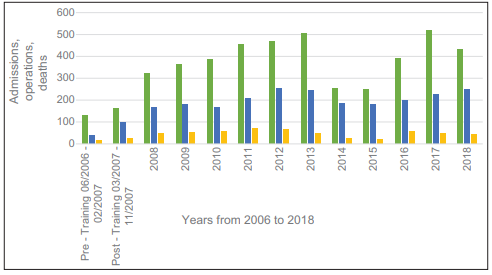Neurosurgical speciality nursing training for neurosurgical facilities in West Africa: A pivotal, prospective single – Hospital study in Nigeria
Main Article Content
Abstract
Background: The diversity of medical and surgical specialities unequivocally places a great demand for continuing subspecialisation within nursing services for safe and efficient patient care, especially in tertiary institutions. Although orthopaedic, psychiatric, obstetrics, intensive care and ophthalmic nursing are established, neurosurgical nursing is almost unknown in West Africa.
Aim: The aim of this study is to document the indigenous training of dedicated subspeciality nursing staff for neurosurgical facilities in West Africa using a simple, reproducible design. Study Design/Setting: A prospective observational study of the effect of specialised neurosurgical nursing care on the volume and outcomes of patient care in a new neurosurgical unit in a tertiary hospital in Nigeria.
Methods: Twenty-six nurses (from nursing officer II to chief nursing officer cadres) were selected from various hospital units for training in neurosurgical nursing. None had previous exposure to neurosurgery, although they had between them 6 months to 30 years of nursing experience in tertiary institutions. They received structured training in neurosurgical patient care.
Results: Over 13 years, we established a fully dedicated neurosurgical facility with 30 speciality nurses and other in-house staff. The pre- and post-training tests showed significant gain in the knowledge of basic neurosciences and neurosurgical patient care. Yearly re-training showed similar results. The increase in numbers of in-patient admissions and operations, as well as reduction in mortality, underscored improved patient care.
Conclusion: Subspeciality training of dedicated nurses in neurosurgical care facilitates the rapid growth of new neurosurgical units, facilitates nursing expertise and improves outcomes of patient care when compared with the lack of neurosurgical training for nurses.
Downloads
Article Details
The journal grants the right to make small numbers of printed copies for their personal non-commercial use under Creative Commons Attribution-Noncommercial-Share Alike 3.0 Unported License.
References
1. Canadian Neurosurgical Society. Specialty Profile. Neurosurgery. Royal College of Physicians and Surgeons of Canada (RCPSC) and Pathway
Evaluation Program. Canadian Neurosurgical Society. Available from: https://www.ccns.org. [Last accessed on 2019 May 29].
2. Rutka J. Report of the Neurosurgery Expert Panel; December, 2007. Available from: https://ozone.scholarsportal.info/bitstream/1873/9865/1/279563.pdf. [Last accessed on 2019 May 29].
3. Emejulu JK, Osuafor C, Ogbuagu CN. Audit of demographic patterns of neurosurgical cases in a tertiary health institution: the need to relate
service delivery to disease profile in dwindling resources and manpower shortage. Afr J Neurol Sci 2009;28:2.
4. Social community for nurses worldwide. The 20 best nursing career specialties. Nurse Journal. Available from: https://nursejournal. org/
community/20‑best‑nursing‑career‑specialties‑for‑the‑future/. [Last accessed on 2019 May 27].
5. Nurse.org Staff. 15 Highest Paying Nursing Careers (Infographics). Available from: https://nurse.org/ articles/15-highest-paying-nursingcareers. [Last accessed on 2019 May 27].
6. Diversity in Nursing and Cultural Competence in Nursing. Available from: http://www.toprntobsn.com. [Last accessed on 2019 Jun 12].
7. UdohDO. Establishing new neurosurgical facilities in resource –Limited settings: overcoming challenges in West Africa. Afr J Neurol Sci
2013;32:68‑72.
8. Emelonye U, Pitkäaho T, Aregbesola A, Vehviläinen‑Julkunen K. Revisiting nursing in Nigeria. Int J Med Biomed Res 2016;5:78‑85.
9. Olade RA. A survey of nursing research in Nigeria. Int Nurs Rev 1990; 37:299‑302.
10. Webb JJ. Nursing research and evidence‑based practice. In: Cherry B, Jacobs RR, editors. Contemporary Nursing: Issues, Trends, and
Management. 5th ed. St Louis, MO: Mosby; 2011. p. 101‑21.
11. Neurology and Neurosurgery. Neuroscience Nursing at Johns Hopkins. Available from: https://www.hopkinsmedicine.org/neurology_
neurosurgery/centers_clinics/neuronursing/index.html. [Last accessed 2019 Jun 12].
12. Neuroscience Nurse. Available from: http://www.registerednursing.org/specialty/neuroscience nurse. [Last accessed on 2019 Jun 12].
13. Nursing Careers and Specialties for RNs. Available from: http://www.registerednursing.org. [Last accessed on 2019 Jun 16].
14. Odeku EL. The beginnings of neurosurgery at the University of Ibadan, Nigeria. Ann Ib Postgrad Med 2007;5:34‑43.
15. Adeloye A. The World of African Neurosurgery. The Tenth E. Latunde Odeku Memorial Lecture; 1985; p. 12-3.
16. Adeloye A. Neurosurgery in Africa: Past, Present and Future. In proceedings. 13th World Congress of Neurological Surgery; 2005. p. 501‑5.


